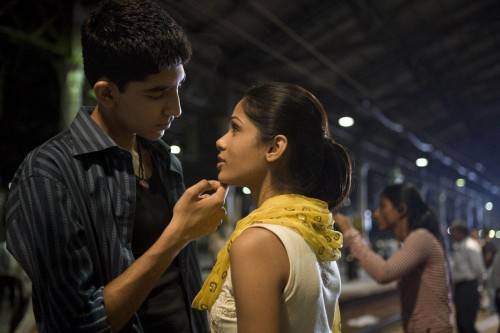 Police Inspector: “Doctors, lawyers…never get past 60 thousand rupees. He’s won 10 million…What can a slumdog possibly know?”
Police Inspector: “Doctors, lawyers…never get past 60 thousand rupees. He’s won 10 million…What can a slumdog possibly know?”
Jamal: “The answers.”
To say that Slumdog Millionaire is on a winning streak is a bit of an understatement. Thus far, the film has secured 4 Golden Globe wins, 5 Critics’ Choice awards, and 1 SAG award. It is currently nominated for 10 Academy awards and 11 BAFTA awards. As of last week, Slumdog has opened in wide release, currently playing at both the Beverly and Savoy theaters. The film has been embraced by critics and fans alike because of its universal, resonating theme of the triumph of the quintessential underdog over seemingly insurmountable obstacles. Director Danny Boyle, whose previous films include Trainspotting, Millions, Sunshine, and 28 Days Later, takes an unflinching look at the ravages of poverty as he shot on location in India, chiefly in the city of Mumbai.
Jamal Malik (Dev Patel as an adult) is a “slumdog,” one of the thousands of impoverished Indian children forced to literally live in heaps of garbage and eke out an existence on the streets. Through a series of incredible coincidences, an 18 year old Jamal finds himself as a contestant on the Hindi version of the television show “Who Wants to be a Millionaire?” He proceeds through the questions to the incredulity of the game show host, the crowd, and even himself. As Jamal is poised to try for the final question, he is abruptly hauled off for questioning by the police, who are certain he is guilty of cheating.
As the police resort to brutality and torture in order to garner his confession, the questions Jamal has answered serve as flashback vehicles that illuminate his journey. This includes his contentious relationship with his brother Salim (Madhur Mittal, as an adult), his life of begging, borrowing, and stealing to survive, encounters with corrupt crime lords and gangsters, and always his love for Latika (Freida Pinto, as an adult), a girl that he meets as a child after a Hindu-Muslim riot leaves them both orphaned. His love for her does not waver despite constant separation and the conspiracy of the Fates to keep them forever apart.
Though Slumdog is the current darling of the award show circuit, some of the people of India are feeling ire instead of inspiration. According to Time online, many of India’s residents are wary of the subject matter, not ready to be entertained by the sometimes violent and unflinching themes of poverty, violence, and redemption-similar to the reluctance of Western culture to view films that require reflection and critical thinking. Some also feel that the film perpetuates harmful stereotypes about India’s poverty. The use of the word “slumdog” has also enraged slum residents who staged a protest outside of Anil Kapoor’s (the award-winning actor who plays the game show host) Mumbai residence. A slum leader in a neighboring village has a pending court case against the cast and crew of the film, citing the offensive use of the term “slumdog” as his primary grievance.
Though the film is not without its controversy, Slumdog Millionaire is a must-see film, the most likeliest and deserving of the candidates to win the best picture Oscar. It is at once both a fairy tale and a gritty realistic piece, a happily ever after that does not come without an exacting price. Love and ultimate redemption cannot be easily calculated into rupees, dollars, or any other currency. Matters of the heart go beyond such limited values. And Slumdog Millionaire‘s greatest achievement thus far may be in its eloquent illustration of how love may just be the only final answer.








